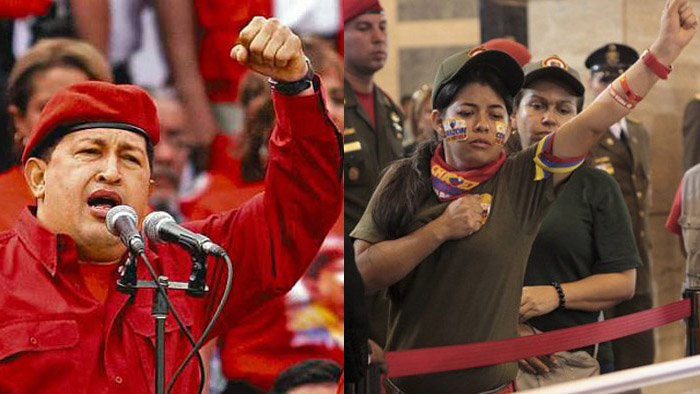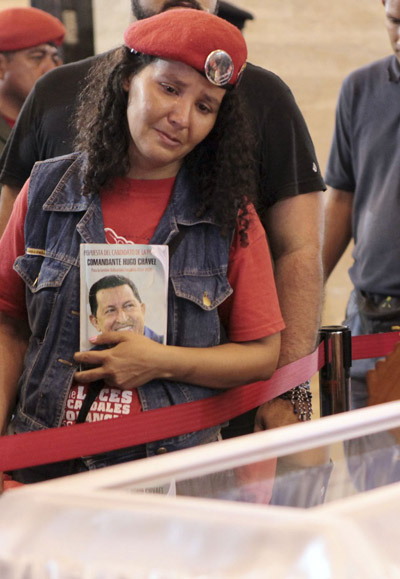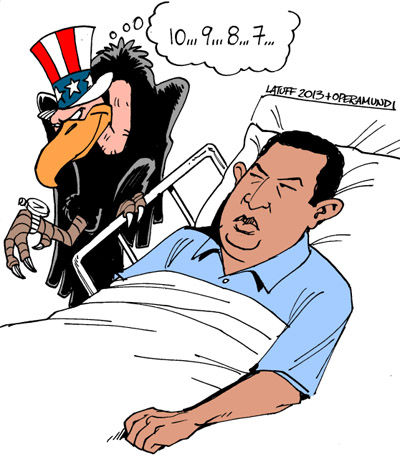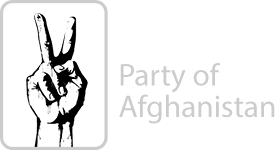Hugo Chavez, the anti-colonial struggler, immortalized in the hearts of his people
- Category: Articles
- Written by Farzad
- Published: Monday, 28 October 2013

A great man, the staunchest supporter of laborers, a model for the national democratic movement in Latin America, and a man whose resistance in the face of hardships and aggressor forces remains exemplary, has left the world. Hugo Chavez, the famous Venezuelan leader who had a long battle with cancer, said goodbye for good on March 6, 2013. His death left millions of his compatriots and all the progressive and anti-colonial forces of the world, in utter shock and grief. But his difficult life left many lessons for the oppressed people.
Nobody’s death in the past few decades has caused this much sorrow and pain everywhere. More than two million people in Caracas waited in long queues so they could meet ‘Commander Chavez’ one last time and pay homage to him. The images relayed by news outlets show the poor people of Venezuela, weeping and mourning while embracing photos of Chavez. If these images have been painful, they also show what deep a place he had in his people's hearts. Several other Latin American countries are also mourning his death and have declared an official mourning period. His death has made headlines around the world in the past few days. Defenders of justice all over the world have expressed their sadness at the loss of this wise leader of the twenty-first century.
Hugo Chavez, strived to improve the lives of the people of Venezuela for 14 years. The day he came to power through elections, the oil-rich country was a first-rate colony of the US, its major economic valves were controlled by multinational corporations, and a small wealthy minority had everything in their hands; poverty and catastrophic conditions plagued the majority of the 29 million population.
Chavez, who had risen from among the masses and had faced poverty himself, promised his people when he got power, that he would improve their lives and cut off the hands of colonizers from his country. Fascinated by the legendary hero of Venezuela and Latin America, Simon Bolivar, in his struggle against Portuguese and Spanish domination, he continued on Bolivar’s path of fighting colonizers, and labeled his political process the ‘Bolivarian Revolution’, and thus began a serious struggle to amputate the US’s hand from his country. He actually pulled his people and country from under the domination of the US and guided them on the path of progress. At a time when most countries in Latin America were ruled by puppets of the US, this was not an easy task. He concluded that to achieve his aims, firstly, he had to rely on the majority of the deprived masses of his country, and secondly, unite other Latin American countries with him.
Chavez strengthened the Union of South American Nations, and was in reality the first national leader from Latin America who was able to revive the revolutionary fervor and struggle against despotism and colonialism, after years of stagnation. These efforts led to consecutive revolts by the people in Brazil, Nicaragua, Bolivia, and several other countries of the continent, which toppled the US puppet regimes and brought to power national and leftist governments. Since Chavez’s regional front had a strong backing of the masses, the US was unable to crush it with all its mischief and intervention. Venezuela has the largest oil reserves in the world and its biggest buyer is the US. Venezuela's oil revenues account for about 85 per cent of export earnings. Cutting off the US from this country cost the US greatly, and immediately after Chavez took power in 1998, it started its sabotage and investment in its mercenaries so they would obliterate his pro-people government. George Tenet, the then-director of the CIA, openly announced that Venezuela is obviously important to them, because it is the world’s third largest supplier of petroleum.

With his welfare programs, Chavez had a wide base among the masses of his country. With his death, his followers will not allow Venezuela to fall under the US and its puppets easily.
The US which has always stood against popular democratic regimes and replaced them with their lackey dictators, launched an extensive campaign against Chavez. For 14 years, the White House did not miss a moment of conspiring and plotting against him. US officials like Bush, Dick Cheney, Rice, Colin Powell, George Tenet, and others who labeled all their opponents, called Chavez a ‘dictator’, ‘worse than Osama bin Laden’, ‘Hitler’, ‘a threat to democracy’ and other such terms. Since Venezuela is the US’s neighbor, Chavez’s opposition had a safe backing in the enemy’s territory and received the unconditional support of the White House from there.
Oliver Stone, the famous American filmmaker, made a documentary in 2009 called South of the Border about Hugo Chavez. The documentary shows Chavez’s life and his work and efforts for democracy and justice, and the ploys and interventions of the US government against him. Scenes of this documentary are informative and inspiring.
In this documentary, we see how the US arms Chavez’s opponents with the weapon of media and the venomous propaganda by many television channel of the US against his democratic government, while Chavez and his government continued to provide facilities for the poor people. The US spy agencies, work extensively in the military for a coup. Finally, in April 2002 after forcing the country towards instability and crisis, they manage to overthrow Chavez’s government through a military coup and bring on a handful of US-bred capitalists, with Pedro Carmona proclaimed as new president. A few hours later, the US announces its support for the new government and the IMF pledges funds.
Chavez is captured and taken to an undisclosed location where he is held under pressure to resign, but he refuses and later recounted, “I was ready to, as Che Guvera said, die on my feet than live on my knees.” When news of the coup reaches the impoverished areas of Venezuela, thousands of Chavez’s supporters storm to the presidential palace and surround the new rulers. The main body of the army also declares its support for Chavez and joins the people. Three days of the new government does not pass when the military supporters of Chavez return him to the presidential seat in a military helicopter. He is yet again the president among the cheers and anger of the poor people and the US lackeys return to their place of origin in the US soil.
The achievements of Chavez’s 14-year old government are countless. Step by step, he weakened private ownership and increased social ownership for the benefit of the majority deprived. In a successful referendum, he changed the constitution and paved the way for necessary reforms.
He nationalized oil from the claws of a handful of plunderers. He used the oil revenues to raise the living standards of the poor people. He put 90,000 barrels of oil at the disposal of Cuba at a special low price. In return, 40,000 Cuban health workers entered Venezuela so they could provide healthcare services to the most remote regions of the country, to the people who had never seen a doctor in their lives.
He not only exported fuel at a cheap price to the poorest countries in Latin America, but also distributed it among the poorest black people of the US. When the people of the US faced terrible storms in 2005, Chavez came to their help and delivered fuel to the oppressed people of New York, Massachusetts and some other cities, forty percent cheaper than the market price, an act that infuriated George Bush.
Chavez made over 100,000 state-supervised cooperatives which have more than one million members who receive numerous benefits from the government.
He exhibited real democracy for the masses by encouraging everyone to take part in discussions about important decisions of the country. The most important cabinet meetings were transmitted live via radio. He spent forty hours per week on average, to talk to people about their difficulties, and always travelled to the poorest areas of the country to survey the progress of welfare programs, without the usual pomposity of other presidents.
By 2010, there were about 30,000 regional municipalities whose members were ordinary people. This was to boost the idea of local democracy and allow people to make decisions regarding their difficulties. He ended the bureaucracy dominating the country and called on the Minister of Municipalities to allow each regional municipality to decide their own projects according to their needs and monitor their progress themselves. This was an important turnaround for the public interest, and the poorest took charge of their fate.
Chavez increased the budgets for health, education and housing every year, to fight against poverty, illiteracy and homelessness. With all the sabotage of the US government, his plans were successfully implemented and the poverty rate which was more than 55% in 1998, dropped to 24% in 2009. More and more people came under the umbrella of health insurance and educational groups.
In 2009, he passed a law to control the rates of biomass such as rice, oil, sugar etc. The law specified the maximum prices for manufacturers so as to control the increase of prices. The poorest of Venezuela benefited from this law.
Following the successful experiences of Cuba, Chavez planned widely for the self-sufficiency of his country. Agricultural products that were being exported before were being processed in factories in the country and made available to the public at low prices.
Chavez began a comprehensive program to nationalize land and took away more than five million hectares of land from big landlords and divided it among peasants. He said:
“Land is not something private, it is of government ownership and should be awarded to those who work on it.”
He placed great value on the role of women and on the International Women’s Day in 2009 said:
“Without the actual emancipation of women, the emancipation of the people is impossible. A true socialist should be a true feminist as well.”

Hugo Chavez was a thorn in the eye of the US. He spoke of the US having a role in his cancer and that of several other left leaders of Latin America. With his death, these suspicions have increased and a sample of his DNA was sent to Russia for further examination.
He founded a ministry for women’s affairs, increased women’s representation in the parliament to forty percent, opened a special bank for women to help businesswomen, chose women to be his cabinet ministers, placed many women in central roles in the ‘United Socialist Party of Venezuela’ which was under his leadership. In general, he made serious efforts to engage women in political, social, economic, and cultural spheres.
When Chavez became the president, he sold the luxurious limousine belonging to the president for his people, donated his monthly salary of 1,200 USD to education projects, and sold many government aircrafts so he could speed up the improvement in people’s lives.
When the US invaded Afghanistan, Chavez was one of the first people to rise in defense of Afghan people. During a television program, he showed pictures of Afghan children killed in the bombings of the US, and protested that the people and children of Afghanistan should not be sacrificed for the terrorism of Osama bin Laden. He said:
“Terrorism cannot be answered with terrorism and slaughtering of innocents.”
Chavez who had fulfilled almost all his promises to the people, won the elections of October 2012 for the third time, but his illness did not give him a chance to accomplish the oath he took for his third term of presidency.
Chavez not only earned a place deep in the hearts of the Venezuelan people, but found supporters all over the world as a successful and resilient anti-imperialist leader. Following his untimely death, international figures expressed their remorse one after the other.
Based on BBC’s report, former US president Jimmy Carter said that although he did not agree with all his actions, he never doubted Chavez’s promise to improve the lives of millions of poor Venezuelans, “President Chavez will be remembered for his bold assertion of autonomy and independence for Latin American governments”
Sean Penn, the famous Hollywood actor said:
“Today the United States lost a friend it never knew it had. And poor people around the world lost a champion.”
Oliver Stone wrote:
“Hugo Chavez will live forever in history. My friend, rest finally in a peace long earned.”
José Serrano, a representative of New York in the US congress expressed sadness at Chavez’s death and praised his contributions to his people. He said:
“Though President Chavez was accused of many things, it is important to remember that he was democratically-elected many times in elections that were declared free and fair by international monitors.”
The sad news of Chavez’s death was announced to the people by his tear-eyed deputy Nicolás Maduro. He accused imperialist enemies for giving him cancer and expelled two US military attaches from the US embassy in Caracas for spying. Maduro who rose from the lower strata of the society as a bus driver, and worked his way to holding important posts and becoming Chavez’s partner, announced with clenched fists that he will continue the ‘Bolivarian Revolution’ with all his strength. He told his people and officials to defend their national unity with more love and efforts. The military also announced that it will defend the territorial integrity and independence of their country.
In his 14 year tenure, Chavez successfully developed a team of ordinary people around him and entrusted them with important posts. They all worked committedly with Chavez for years to implement his democratic and welfare programs. Now that Chavez is no longer there, it is hoped that this team, led by Maduro, will continue Chavez’s legacy with the same determination, and stop the US lackeys’ sabotage from making Venezuela a center of the White House’s plundering.
As an exceptional leader in Latin America, Chavez showed that by relying on the poor people, the greatest superpower armed with the most advanced killing machine and the weapon of media, can be defeated and people’s fate can be changed.
But the greatest leaders may also make serious mistakes in certain circumstances. I think one of Chavez’s biggest mistakes was his very close ties with the fascist Iranian regime of Velayat-e faqih. His friendship was with a regime that had no affinity with his ideas and ambitions. He was so abhorrently close to the murderers of the Islamic Republic that he completely forgot the pain and misfortunes of the people and freedom fighters of Iran at the hands of this medieval and killer regime. He never even once rose to the defense of thousands of struggler and resisting women and men, tortured and killed in the Ahmadinejad-Khamenei slaughterhouses. With this alliance with the anti-democratic, ignorant, and anti-people Akhundi regime, Chavez saddened the dissidents and progressive forces of Iran and the world. With all his deep knowledge and awareness as to the nature of the US imperialism, he could not recognize the secret ties and dealings of the brutal Iranian regime with the US and west, and could not understand that the Iranian Akhunds and Islamic fundamentalists in general, have been clearing the path for colonial and bullying strategies of the US in Asia for the past thirty years.










